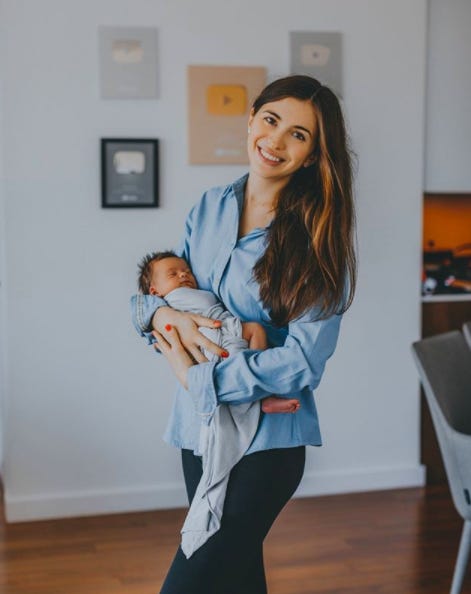How to manage multiple businesses and hire remotely
Marina and I met 2 years ago here in Silicon Valley, and she is a total badass! Marina is managing three companies, creating content for 3 different YouTube channels, producing digital-products along with online courses for language learners, raising a daughter, and planning to enter the Chinese social media market. We talked about remote teams, hiring, social media, building virtual communities, and diversification of income streams.
You can check this interview as a podcast:
https://the-meeting.captivate.fm/episode/marina-mogilko-joins-the-meeting

Luba: You are successfully managing a remote team right now. How did it all start?
Marina: My story of building an online team goes back to 2013. We originally started with offices in St. Petersburg, and when we realized that we wanted to expand our business (and back in those years, it was a study abroad booking agency), we had to open an office in Moscow and other Russian cities. I hated traveling to those offices. So we came up with an idea of an online business, and I thought that if clients were booking online, why don’t we set up the team remotely? Every time I came to the office, I had this urge to talk to people, to be sociable. I realized that instead of working 8 hours a day, I worked 4, spending the rest 4 on communication and lunch breaks.
Luba: What do you like about working from home?
Marina: First of all, saving time and energy. I have a bunch of other things to ‘invest’ my energy in, such as my family.
Luba: Has coronavirus affected your business?
Marina: All of our employees remained, but we had to let go of some of our contractors. We have two focuses on LinguaTrip: online and travel. The last is luckily not completely dead, because we still have some bookings.
We went from 80 people in total to 53. But as a company, we are becoming more efficient, diving deeper into processes. We are looking at the pandemic in a positive way.
Luba: You hire a lot of folks internationally, how do you ensure they are successful?
Marina: Rule №1: always have instructions for everything: you see a person as a set of functions, things that need to be done, and their KPIs. It is really important for them to see the whole framework, a person who they report to, a person who they ask for advice.
As a founder, you have to set up a framework that is convenient for you, because we all see things differently. If you do not create clear instructions, it will be a total mess.
Rule №2: Set up a tracking software for people, whose KPIs you control. Always stay aware of the time you are paying for, and check on everything before you know that they can manage it all on their own.
The more details the better!
Rule №1: always have instructions for everything. Rule №2: Set up a tracking software for people, whose KPIs you control.
Luba: I love the process you’ve described! How many businesses are you running right now?
Marina: LinguaTrip, Linguamarina Inc, Fluent Express. I also have YouTube courses and digital-products, so that’s a lot of stuff :)

Originally posted on Instagram
Luba: Are you fully or partly operational in each of these businesses?
Marina: I do a lot in LinguaTrip, and I do a lot on my YouTube company.
Luba: How do you manage it all?
Marina: I am trying to limit my work to 4 hours a day because otherwise, I would be working all the time without spending time with my family.
Luba: Sounds like you have a great work-life balance. Was it your goal from the beginning?
Marina: That was my goal when I got pregnant because I realized once the baby is here, I won’t be able to work 8 hours a day anymore. This is when we started creating all the instructions, when I started hiring people that I would trust long-term, setting up everything in case I want to retire.

Originally posted on Instagram
Luba: Was the situation different before the baby?
Marina: I used to say ‘yes’ to everything, and now I understand that I have to say ‘no’ to some stuff. Now it is about limiting the number of projects that I have.
Luba: When is the best time to start hiring new people and shifting responsibilities?
Marina: When you are sure that you have all the instructions and KPIs when you understand exactly what the person is going to do, and exactly what you are going to delegate. It is also important to understand that you can never delegate strategy. Hiring people who are able to do it is really pricey. By Delegating operations, your day-to-day processes are ok, but you can’t expect a person to come from another company and draw a target line for your business. The strategy should be purely on you.
Delegating operations, your day-to-day processes are ok, but you can’t expect a person to come from another company and draw a target line for your business. The strategy should be purely on you.
Luba: How did you manage to build multiple businesses?
Marina: I have a role model for every business. I love to learn from serial entrepreneurs.
My role model is Oleg Tinkov. He had a food company, a beer company, the famous Russian bank. It does not mean that he is an expert in the beer industry, food production, and finance. He is just good at finding the right people, who help him grow his businesses. He understands how he can make the processes more and more efficient.

Tinkoff Bank (Founded by Oleg Tinkov) is a Russian commercial bank focused entirely on remote servicing, rather than retail outlets. The photograph is taken from Instagram.
Luba: And how has your perspective of a company building has changed after relocating to Silicon Valley?
Marina: When we came here, we realized that we did not want to be on the investor needle, which means that you can survive only by raising another round. We returned back to Russia for one year just to make sure that we were cash positive so we could finance everything ourselves, and not be dependent on other people making decisions for our company. This is what makes a business healthy.
People focus more on raising money instead of building a product, which is a complete mistake.

Posted on Instagram
People focus more on raising money instead of building a product, which is a complete mistake.
Luba: How can one get started with diversifying income?
Marina: When I started building diverse income sources, I was thinking about trying new things. Then you need to understand which of those things you enjoy the most. First, we started LinguaTrip, then I got my first 1000$ from my YouTube channel, and I decided to dive deeper. Afterward, we launched online courses, which are literally saving us now, and then I started my own YouTube course.
Luba: Speaking about online courses, most tend to think that a lot of people are not willing to pay for an education, because the content on the internet should be free. What are your thoughts on that?
Marina: It all depends on personality. There’s a great platform ‘Masterclass’, where people are willing to pay for the digital-products they offer. It is all about brand and producing quality content.
When you are paying for your education, you become more responsible for it, right? You’ve already spent money, and there’s less risk that you will drop off.
Luba: Can one create a paid course without a significant following?
Marina: When I started producing my YouTube courses, I only had 100 true followers. If you have 100 people who love you, and they invest 100$ in your product, then it makes 10000$ a year. And if it’s 1000 people who love you, then it’s even more. If you are a creator, you do not need 1m subscribers, you just need 1000 true fans, and then you can make a living off of it. That’s a whole theory.
Luba: How do you know that you are prioritizing your work correctly? Do you set metrics for yourself?
Marina: Every week we sit down with my husband when we define two actions for the next 7 days, which can lead us to bigger goals. These are the actions that we tend to forget about, being overloaded with day-to-day operations.
For example, next week I need to find a person who is going to run my social media in China because China is my top priority right now.
Luba: You’ve mentioned China as your main goal. How are you going to focus on it?
Marina: I am not sure that I can crack it, but I want to try. A lot of my content is copied there, and it’s getting a lot of traction, which means that Chinese people like these topics.
The majority of money in China is made by live streams, but if you are not a Chinese citizen, you can not even go live. I am trying to find a person who would help me with my social media, and then we’ll see how we are going to deal with it.
China is the №1 market for language learners, and we really want to be there.
Overall, Marina and I had a truly pleasant conversation. I learned that it is necessarily important to say ‘no’ sometimes, to delegate and create clear instructions before deciding to take a step back. I am already intrigued to try all these ‘hacks’ at my work. What about you?


